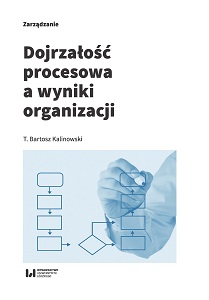Dojrzałość procesowa a wyniki organizacji
Business process maturity and organisational performance
Author(s): Bartosz T. Kalinowski
Subject(s): Economy, Business Economy / Management, Financial Markets
Published by: Wydawnictwo Uniwersytetu Łódzkiego
Keywords: business process maturity; business process maturity model; BPM; BPO; organisational performance; financial performance; research; dojrzałość procesowa; modele dojrzałości procesowej; wyniki organizacji; wyniki badanych przedsiębiorstw
Summary/Abstract: Processes are an inherent element of any technical, social or organisational system: they are present in every organisation, regardless of its type, size or operations. Processes are defined as sets of interrelated activities that transform inputs into outputs. Additionally, processes are important from an internal point of view (e.g. being necessary to coordinate the performed tasks, allocate resources or improve these activities). They are also crucial for external operations (e.g. directing the performed activities towards the requirements of external customers or facilitating the functioning of the organisation in a highly unstable environment). The orientation towards processes, depending on the theoretical framework applied, may be reflected in the implementation of concepts such as the Process Approach, Business Process Management or Business Process Orientation. In turn, the degree of advancement in the implementation of these theoretical models is reflected in the notion of Business Process Maturity. Business Process Maturity can be defined as the degree of explicit definition, management, measurement, control and effectiveness of organisational processes (W. Humphrey) or their ability to systematically provide better business results (McCormack and Johnson). Furthermore, Business Process Maturity is operationalised in Business Process Maturity Models, which were designed to be implemented by companies to shift business process management from an “as-is” state, where processes are undefined and underperforming, to a desired “to-be” state, in which processes are continuously improved. The strategic orientation of business processes is indicated as one of the sources of competitive advantage and perceived by companies as a key factor in market success. Therefore, apart from focusing on the development and implementation of processes, enterprises also strive to improve their performance and both financial and non-financial results. The main aim of this thesis is to analyse the impact of Business Process Maturity on the financial and non-financial results of an organisation. To this end, the following detailed objectives were formulated: 1. Analysing literature and previous research on Business Process Maturity and the development of the “state-of-art” report. 2. Researching the level of Business Process Maturity within Polish enterprises, including the development of an original Business Process Maturity Model, together with its implementation methodology. 3. Analysing the relationship between subjective and objective methods of assessing Business Process Maturity. 4. Analysing literature and previous research on the impact of Business Process Maturity on the financial and non-financial results of an organisation and the development of the “state-of-art” report. 5. Researching the financial and non-financial results achieved by Polish enterprises, including the development of an original comprehensive measurement model of organisational results. The thesis is divided into seven parts. The first part comprises an introduction and a presentation of the aims, research questions, hypotheses and research model. The second part deals with general issues on processes and maturity and is intended as a theoretical foundation and introduction to further considerations. The third part focuses on a discussion of various aspects of process maturity: initially, an attempt is made to synthesise the concept of process maturity in the context of previous research. Next, selected Business Process Maturity Models, maturity levels, the principles of Business Process Maturity Model development and business aspects of maturity model implementation are presented. The fourth part is devoted to an analysis of previous research on Business Process Maturity Models and their use for the assessment of Business Process Maturity in companies. This part concludes with a proposal for an original Business Process Maturity Model, along with the Business Process Maturity assessment methodology. Both of them served as measurement tools in the conducted research. The fifth part begins with an analysis of the relationship between Business Process Maturity and performance. Further analysis of the literature on performance definition and methods of measuring financial and non-financial results in enterprises, as well as previous research on the stated relationship are also presented. The fifth chapter covers a proposal of an original comprehensive measurement model of the organisational results. In the penultimate part of the thesis, empirical evidence resulting from six research studies conducted on the types and nature of the relationship between Business Process Maturity and performance are presented and analysed using a structural equation modelling method. Finally, the seventh part comprises a summary of the whole thesis and directions for future research.
- E-ISBN-13: 978-83-8142-345-8
- Print-ISBN-13: 978-83-8142-344-1
- Page Count: 372
- Publication Year: 2019
- Language: Polish
- eBook-PDF
- Sample-PDF
- Table of Content

